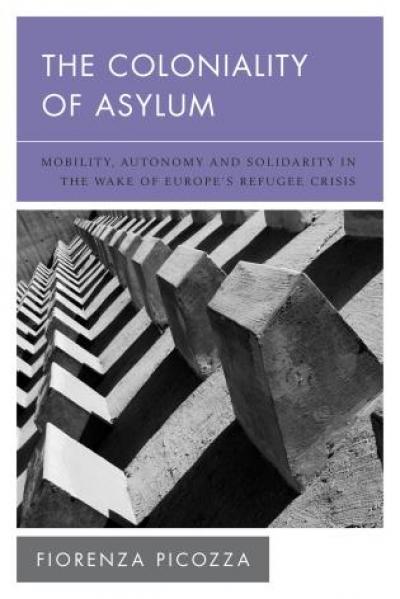Book Review: The Coloniality of Asylum: Mobility, Autonomy and Solidarity in the Wake of Europe’s Refugee Crisis
Posted:
Time to read:
Guest post by Dr Gemma Bird. Dr Gemma Bird is a Senior Lecturer in Politics and IR at the University of Liverpool. Her research sits at the intersection between political theory and IR, focusing recently on activist scholarship, migration and citizenship. She has recently published in Palgrave’s International Political Theory Series and the journals Global Policy, Cooperation and Conflict and Citizenship Studies. She also volunteers with grassroots organisations working with refugees in Greece. Gemma is on Twitter @gemmakristina.
Review of The Coloniality of Asylum: Mobility, Autonomy and Solidarity in the Wake of Europe’s Refugee Crisis, by Forenza Picozza (Rowman & Littlefield 2021).

The introduction takes us on a journey with Picozza, when, in the early days of this particular research project in 2015, she meets with an Afghan friend in Hamburg that she had got to know while working in Rome. After they share dinner together, he suggests that she should visit the train station the following day to better understand the situation of people transiting through the city as well as the people supporting them. This sets the scene for the book and the starting point of the ethnographic work at the heart of it. From that point onwards Picozza interweaves her experiences with key theoretical interventions and insights in a way that feels vital and important.
Her work reminds us that Europe is not simply a passive recipient of people claiming asylum. Rather, Europe ‘politically, legally and socially produces ‘refugees’’ (xxiii), and at the same time people claiming asylum are not ‘Other than, or external to, Europe, in fact they are very much internal to- and producers of- the European space where they live and through which they move and struggle’ (xxiv). This understanding of European space as being deeply entrenched and entwined with asylum struggles, as having a historical and contemporary role in the conditions creating displacement, are an important reminder of the underlying theme of the book, the coloniality of asylum.
This conception of Othering, marginalisation and coloniality is not only raised in connection to states and asylum regimes but also asks questions in spaces and places of activism and solidarity. As Picozza opens Chapter 2 she talks about an evening she spent at a ‘Refugees Welcome’ fundraising event at the Molotow Club in Hamburg where she finds herself ‘particularly alarmed by the way some anti-racist activists seemed to revendicate a sort of moral superiority on apolitical volunteers’ (21), a point she then comes back to later in Chapter 3. She also draws on her previous experience in Rome to remind us of the asymmetrical relationships that can often occur in spaces of solidarity and support, of situations where distinctions form between those who ‘needed help and those who provided help’ (24). Such observations will strike a chord with many who have spent time in spaces such as these, and especially those of us who look to navigate the line between activist and scholar. Picozza’s honesty about her own discomfort in some of these spaces and in treading the line between help, solidarity and activism is valuable in pushing others to also think about our own positionality in the field. Like Natasha King’s (2019) observations of her time spent in a squat in Calais, these ethnographic reflections are key to pushing us all to think more deeply about our own embodiment within these spaces, as scholars, as volunteers and as activists, and how these experiences are situated within broader issues of anti-racism and coloniality.
Picozza’s honesty throughout the book is both a necessary and refreshing approach to activist scholarship. She reflects on the politics of these spaces as well as her own sense of not quite belonging—neither amongst other scholars nor amongst other activists. This questioning of her own position in these spaces, its fluidity and what roles she can or should play (facilitating money transfers, for example), are thoughts that I and many others will also have had. Her honesty in writing about these situations, in sharing her own experiences and discomforts and not just those of her interlocutors, makes this book a vital read for a number of different groups. It is, of course, an important text for others embarking on embedded ethnographic work in asylum spaces who come from the position of activist scholars. Beyond that, I think the book speaks to a wider audience. Even for those not engaged in this type of work, Picozza underscores the intricacies, challenges and values of ethnographic research whilst at the same time making an important theoretical contribution in a research space that should and must engage with questions of coloniality and solidarity deeply and regularly. This is one of those books that will sit with me and influence my work for a long time to come, and one I would highly recommend to anyone about to embark on an ethnographic journey, especially in the context of being an activist scholar.
Any comments about this post? Get in touch with us! Send us an email, or post a comment here or on Facebook. You can also tweet us.
__________
How to cite this blog post (Harvard style)
Bird, G. (2022) Book Review: The Coloniality of Asylum: Mobility, Autonomy and Solidarity in the Wake of Europe’s Refugee Crisis. Available at: https://www.law.ox.ac.uk/research-subject-groups/centre-criminology/centreborder-criminologies/blog/2022/04/book-review [date]
Share:








